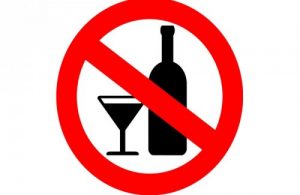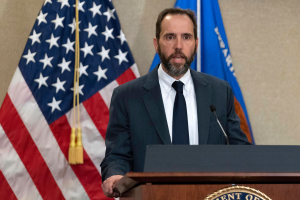A Trump Enabler Takes a Step
Friday, December 19th, 2025By Bob Gaydos
Donald Trump has “an alcoholic’s personality.”
Who says so? The woman who should know. The woman who runs his household, makes sure he looks ready for the day ahead and structures her own life around his anger, insecurities and alcoholic unpredictability. The one who manages the unmanageability.
Susie Wiles. His enabler.
When I read that Wiles, Trump’s chief of staff, had given a Vanity Fair writer 11 months of remarkably honest conversations about what Trump is like, how he thinks and operates, warts and all, I was stunned. What the heck is she doing? I wondered. She knows Trump. You can’t tell the truth about him without paying the price. And she knows Vanity Fair is going to report the truth. This is political suicide.
After sleeping on it, I came up with another explanation. She knows better. She’s not Rudy Giuliani (who also has an alcoholic’s personality), standing in front of Four Seasons Landscaping garage instead of The Four Seasons Hotel in Philadelphia, arguing that Trump was robbed in the 2020 presidential election.
It’s not political suicide. It’s a warning shot and the first stage of an escape. The enabler went to Al Anon.
Now, I don’t know if Wiles actually ever attended meetings of Al-Anon, a 12-step group for people whose lives have been significantly impacted by the drinking and alcoholic behavior of someone close to them. But, as Wiles disclosed, her father was Pat Summerall, who played football for the New York Giants, was a popular sportscaster and, by the way, was an alcoholic who eventually managed to have 20 years of recovery.
She was certainly a candidate for Al Anon. If she went to meetings, she would’ve learned that she didn’t cause the alcoholic’s behavior, can’t control it and certainly can’t cure it. What she can do is focus on herself and her own well-being, set boundaries and support the alcoholic — without enabling him.
Wiles may have gotten to the point where, knowing that Trump is not about to change – in fact, appears to be getting worse – that her own self-interest would be best served by getting out of Dodge. Honey, I’m outta here.
And honey, by the way, I know a bunch of your secrets and a bunch of good lawyers, so please don’t try to stop me or hurt me.
Of course, in Wiles’ case, she has not been an innocent victim, along for the ride because she had no choice. She had a choice. She said yes to Trump. She knows where the bodies are buried. Like Haldeman for Nixon, she’s seen the enemies list. She bears responsibility, as a primary enabler, for much of the pain Trump has caused other people
She knows what he’s been doing and has helped him each step of the way, one day at a time. Her charge that the article was a hit job and claims of trying to persuade Trump away from exacting political revenge ring hollow.
But spilling the beans and your guts on Trump without having an exit plan makes no sense. If you can’t detach with love, then do it with confidence and a landing pad. Having “White House chief of staff” on your résumé doesn’t hurt.
So, it doesn’t look like Trump‘s going to rehab. Actually, he doesn’t even drink. That leaves assisted living at Mar-a-Lago or prison. Maybe Wiles sees this happening sooner rather than later and is packing her bags. She’ll probably write a book.
In any event, if my guess is correct and Wiles is planning her escape from the unmanageability of Trump’s “alcoholic” behavior, she might do well to take a look at some of the other steps in the Al Anon program. The ones about taking a fearless personal inventory of her shortcomings, making amends to people she has harmed, promptly admitting when she is wrong and, having had a “spiritual awakening,“ practicing these principles in all her affairs.
Her father, who went to the Betty Ford Clinic and then attended Alcoholics Anonymous meetings, spoke openly about practicing those principles.
Honesty is the first principle of all 12-step programs. I applaud anyone in Trump‘s inner circle being publicly honest about him. It’s rare these days. But it sure would be nice if one of them also took responsibility for their part in enabling the insanity.
That would be Step Four, Susie.
***
(Bob Gaydos has written a column on addiction and recovery for nearly 20 years.)






